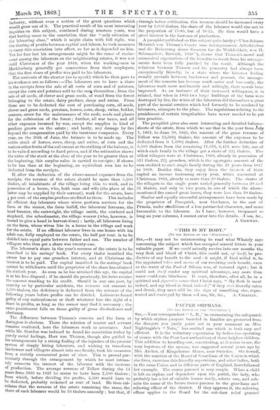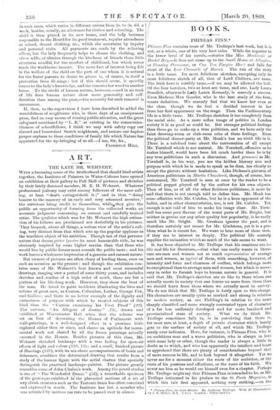PAUPER ORPHANS.
uro THE EDITOR OF THE "SPIH:TATOR.1
Snt,—Your correspondent " L. B.," in enumerating the safeguards by which orphan paupers hoarded in families are protected from the dangers you justly point out in your comment on Miss
Nightingale's " Note," has omitted one which is both easy and efficient. It is the voluntary supervision by ladies (co-operating of course with the Poor Law authorities) of these helpless children. This addition to boarding-out, constituting, as it seems to me, the very keystone of the system, was suggested several years ago by Mrs. Archer, of Kingsdowne House, near Swindon. She herself, with the sanction of the Board of Guardians of the Union in which she lives, exercises this friendly supervision, and other ladies, both in the same Union and in different parts of England, have followed her example. The course pursued is very simple. When a child is left an orphan and dependent upon the parish, the lady, who probably has a list of suitable homes ready, selects one, and submits the name of the future foster-parents to the guardians and
relieving officer of the district. If they approve it, the relieving officer applies to the Board for the out-door relief granted in such cases, which varies in different unions from 2s. to 3s. 6d. a week, besides, usually, an allowance for clothes and schooling. The child is then placed in its new home, and the lady becomes responsible to the Board for its good treatment, regular attendance at school, decent clothing, &c., which she ascertains by inquiry and personal visits. All payments are made by the relieving officer, but the lady frequently helps to choose the clothing, and often adds, or obtains through the kindness of friends those little etexteras needful, for the comfort of childhood, but which never reach the workhouse inmate. The mere fact of interest being felt in the welfare of the child on the part of one whom it is natural for the foster parents to desire to please is, of course, in itself a protection from ill-usage ; but if this should occur, it speedily comes to the lady's knowledge, and she removes her ward to another home. To the credit of human nature, however,—and in no rank of life does human nature show more generosity and selfdevotion than among the poor,—the necessity for such removal is uncommon.
If, then, to the supervision I have here described be added the watchfulness of neighbours who, in these days of an omnipresent press, find an easy means of rousing public attention, and the great safeguard mentioned by " L. B." as existing in the communicativeness of schoolfellows, I think we may with safety copy our shrewd and benevolent Scotch neighbours, and restore our hapless pauper orphans to those conditions of family life which Nature has appointed for the up-bringing of us all.—I am, Sir, &c., FLORENCE HILL.



































 Previous page
Previous page